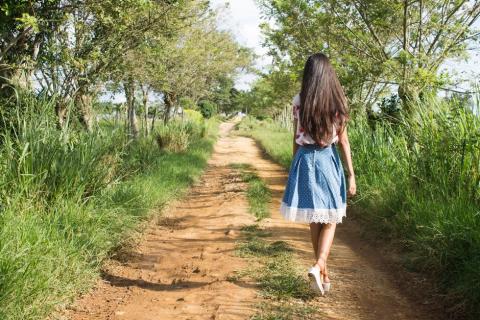
I grew up in Pampa, a small town in the dusty, flat Texas Panhandle. There, football reigned supreme—so much so, Dateline NBC featured it as a “Friday Night Lights” town in 2006—and schools combined prayer with academics and the numerous Baptist churches successfully banned MTV until the mid-1990s. Most recently, this is where more than 88 percent of the town (and surrounding county) voted for Trump and the Top of Texas Republican Women’s Club endorsed him.
Pampa is a place where, unfortunately, I can (almost) understand how it’s possible women could vote for a presidential candidate who so clearly believes women have no value. As a young woman in Pampa, I was inundated with messages about my destined future role as a mother. Although, “future” was a relative term: At that time, we had one of the highest pregnancy rates in the United States, and I lost two high school debate partners in one year because they dropped out to have (unexpected) babies. I was regularly informed that if I wanted to pursue a career, I had the options of being a secretary, a nurse, or a teacher. This world teaches young women they aren’t leaders, that “big, strong men” set the course for everyone else to follow.
My own paternal grandparents, who raised me, believed in gendered roles. Mimi fetched Papa’s coffee and did all the cooking because, as she repeatedly told me, “he’s the one that paid the bills.” However, they were also avid readers. It’s because they shared this love with me that I grew up to baffle them with my feminist principles.
Mimi read voraciously, often sitting at the big kitchen table, plowing through Louis L’Amour paperbacks. When she was finished with a stack of books, she’d take me to the library and I’d add a few of my own selections to her pile. But then the tiny library couldn’t keep up with my own insatiable reading, and she enrolled me in mail-based programs that sent me three or four books every month, starting with titles like Cloudy with a Chance of Meatballs and eventually leading me to Judy Blume’s Blubber.

Around the time I entered sixth grade, we got a bookstore in the small mall on the far outskirts of town. Both of my grandparents would take me to buy books, but my favorite trips were with my grandfather. Born and raised in Pampa, Papa knew everyone, and his time at the mall was spent “shooting the breeze” with all the other people his age. That gave me ample time to claim a spot on the carpet in front of the Young Readers section and explore the books. I would pick one to spend my allowance on that day, one I could usually talk Papa into buying, and another for which I’d calculate the tax so I could save up for it.
One of my favorite saved-for books was Maggie Adams, Dancer by Karen Strickler Dean. I was struck by the girl on the cover, sitting backwards on a chair in a dance studio, looking like the high school-age sister of one of my friends. I was too tall and too clumsy to execute a decent somersault, so the idea of being good at ballet fascinated me. After reading the book, what really struck me was, unlike most of the “teen” books I read, this one did not end with the girl kissing the guy. Instead, this novel concluded with the protagonist finally performing the coveted role of the Sugar Plum Fairy in The Nutcracker and then being asked to autograph a little girl’s program, which she signed “Maggie Adams, dancer.”

This book showed me that it was okay to be more focused on a career and on what I wanted to do with my life, that I didn’t have to be defined by whether or not I had a boyfriend. That I didn’t need a man to tell me what to do, period.
My grandparents didn’t monitor my reading and Mimi didn’t hesitate to let me buy a subscription to the loudly feminist magazine Sassy. I’m still 99 percent sure that Sassy was the first place I actually saw—and quickly adopted—the word feminist. However, it was early “young reader” books like those written by Judy Blume and Karen Strickler Dean that helped me see beyond the limits of Pampa, Texas.
Jesaka Long is a Lighthouse Young Writers Program instructor and leads the Young Authors Collective. Her next class, Fearless Essay for grades 9 to 12, starts February 7.

